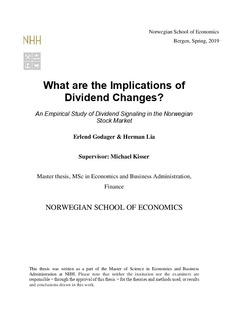What are the implications of dividend changes? : an empirical study of dividend signaling in the Norwegian stock market
Master thesis
Permanent lenke
http://hdl.handle.net/11250/2612204Utgivelsesdato
2019Metadata
Vis full innførselSamlinger
- Master Thesis [4372]
Sammendrag
The purpose of this thesis is to investigate the dividend signaling theory’s relevance at the Oslo Stock Exchange in the period from 2006 to 2018. First, we analyze the short-term effects of dividend changes, measured by the abnormal stock returns around the dividend declaration day. Second, we investigate the long-term effects of dividend changes by regressing future earnings changes on dividend changes and a set of control variables.
We find significant abnormal stock returns when firms announce dividend increases, which are followed by superior changes in earnings the following year after the declaration day, being robust to several controls for expected earnings, including past earnings, returns, and matching. When split by firm size, the superior change in earnings the following year is only significant for smaller firms. However, the increase in earnings is just temporary, as we find no permanent increases in earnings for horizons up to two and three years. When applying alternative accounting measures of earnings, the dividend changes’ ability to predict earnings disappears even for the first year. Unchanged dividends contain limited information content both for the short- and long-term, whereas dividend decreases provide mixed results. While presenting partly support for the dividend signaling theory, this explanation does not provide a fully satisfying answer as to why Norwegian listed firms pay dividends. Evidently, firms have different incentives to pay dividends, and the signaling theory is only one of several viable explanations to the “dividend puzzle”.
Keywords: Dividends, Signaling Theory, Market Reactions, Information Content, Oslo Stock Exchange
